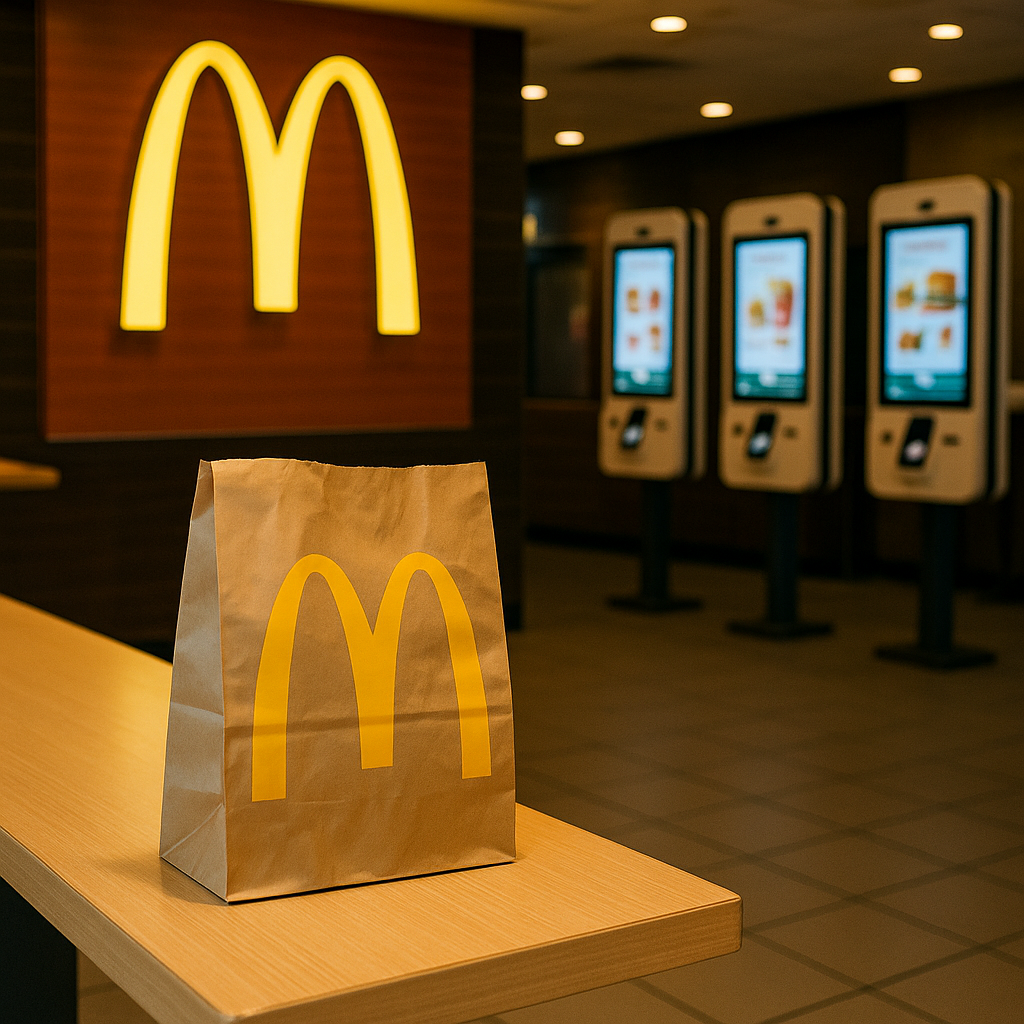Ten Pence for Carrying Convenience: Shining Light on the Fast‑Food Bag Levy

Introduction
A previous reflection noted that technology mirrors the soul of society rather than mastering it. The mirror now widens to a familiar crossroads: the high‑street McDonald’s. Lunchtime traffic flows past bright self‑order screens that promise speed, yet an unexpected prompt appears — “Add a none-optional takeaway bag: £0.10”. The legal charge for single‑use plastic has drifted into an unofficial fee on paper. What began as stewardship of creation risks becoming a stealth tax on the hungry. The sections that follow place the moment under a brighter lamp, charting the forces behind the levy and outlining peaceful ways to bend the arc toward fairness.
1 Regulation Drift: When a Rule Outgrows Its Warrant
Setting the scene In October 2015 England introduced a £0.05 levy on single‑use plastic carrier bags. The aim: curb the 7 billion annual figure that littered hedgerows and oceans alike. In May 2021 the minimum charge doubled to £0.10 and was extended to all retailers — yet only for plastic. Paper remained untouched in statute.
Facts on record
- Government impact assessments record a 95 % fall in plastic‑bag distribution between 2015 and 2024, but a parallel rise in paper‑bag tonnage.
- Primark famously gave thick paper totes away free, counting them as marketing spend; McDonald’s now adds ten pence, citing “aligning with environmental goals”.
- No parliamentary text mandates a paper‑bag fee. The policy rests on corporate discretion, thinly wrapped in green rhetoric.
Mechanism at work Legislation created a vacuum. Corporate risk teams chose uniformity over nuance: charge every bag. The consumer, tired and time‑poor, rarely challenges the extra tap at checkout.
2 Choice Versus Presumption: The Quiet Power of Defaults
A self‑order screen frames the decision. The “Yes, add bag” option appears highlighted; the “No thanks” sits greyed below. Behavioural economists call this the nudge. Default pathways convert hesitation into revenue.
Illustration
A customer buying a £1.49 hamburger now pays £1.59 if the prompt is accepted uncritically — a 6.7 % uplift concealed in UI design.
Change lever Refusal remains lawful and simple: bring a reusable container, ask for the wrapper only, or carry by hand. Awareness converts presumption into genuine choice.
3 Where Are the People? Automation, Hidden Labour, and Cost Shifting
McDonald’s once prospered on smiles behind counters. Today, human presence recedes:
- Ordering Touch‑screens handle 90 % of UK transactions (McDonald’s 2024 investor deck).
- Cooking Automated fry stations roll out in test regions.
- Cleaning Visible staff clear trays; back‑of‑house employees remain unseen.
Economic transfer The business saves staffing cost yet adds micro‑fees to the bill: dine‑in VAT, takeaway‑bag levy, kiosk upsells. The guest funds both automation and packaging.
4 A Lawful Torch: Using Article 15 UK GDPR to Demand Sight
Right in statute Every individual may request all personal data held, including CCTV imagery that identifies them. The controller must respond within 30 days (extendable only for complexity) and supply footage free of charge.
Practical guide
- Provide identifiers Receipt number, clothing description, payment method timestamp.
- Await delivery Video must arrive on a viewable medium; any redaction of third parties is the business’s cost.
- Escalate if ignored Non‑response permits complaint to the Information Commissioner’s Office, which may levy fines.
Draft a concise letter
"Under Article 15 UK GDPR, supply all personal data held about me, including CCTV images capturing my entry to and exit from your premises at [location] on [date/time]."
Why it matters Redaction software, legal review, and staff hours swiftly outweigh ten‑pence gains. A chorus of lawful requests forces boards to re‑examine data retention and bag‑charging policies alike.
5 Living Without Joinder: Non‑Compliance as Constructive Presence
To live in the world yet decline unhealthy joinder need not involve anger. Peaceful options stand open:
| Action | Immediate Effect | Long‑Run Signal |
|---|---|---|
| Decline the paper bag | Saves the fee and paper waste | Demonstrates demand for waste‑free service |
| Bring a reusable container | Normalises container culture | Encourages packaging‑light menus |
| Submit GDPR requests | Stretches compliance resources | Presses revision of surveillance‑heavy models |
| Share experiences publicly | Spreads awareness | Fosters collective leverage |
Repeated small refusals and lawful assertions remind corporations that consent is earned, not assumed.
6 Lighting the Path Forward
Carrier‑bag history shows policy can evolve. When plastic taxed minds and margins, alternatives emerged. A similar turning now waits: paper fees will fade once seen as voluntary and redundant.
A community that values transparent stewardship can:
- Support merchants offering genuine reusable incentives.
- Celebrate minimal‑packaging eateries.
- Petition local councils for clearer signage that a bag remains optional.
- Continue exercising data‑access rights until surveillance aligns with necessity.
“The light shines in the darkness, and the darkness has not overcome it.”
Thoughts for Reflection
- Does the environmental argument justify a blanket fee on paper?
- Will mass Subject Access Requests accelerate fair pricing or burden the innocent?
- How might a smile‑and‑service culture return to the high street?
Eyes ready to see and ears prepared to hear may shape answers that turn levy into liberty. The choice remains open.
